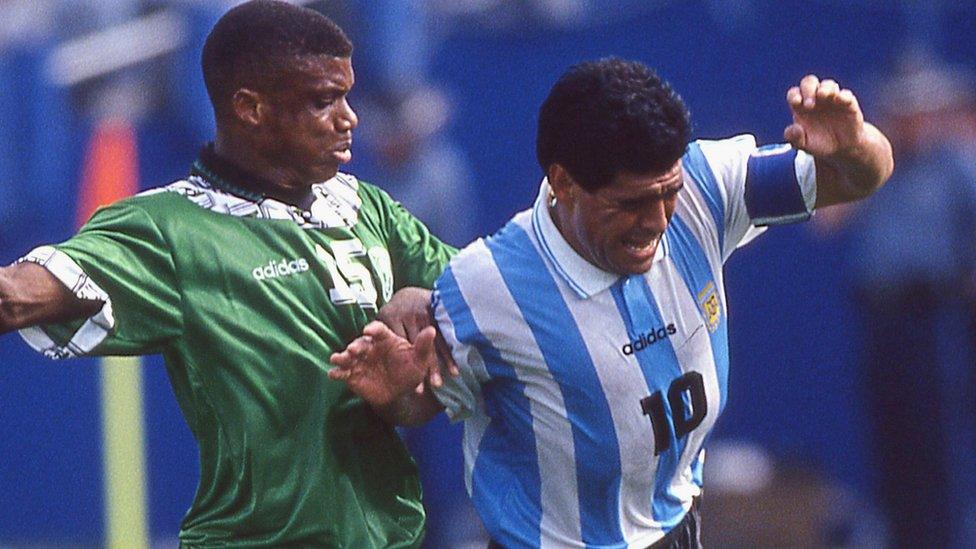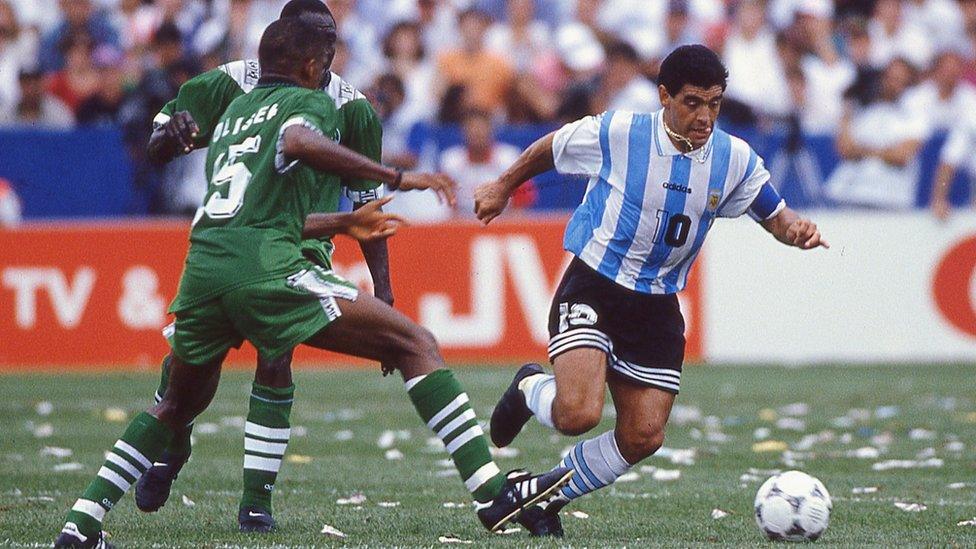What was it like to mark Maradona?
- Published

Sunday Oliseh tangles with Diego Maradona in the Argentina-Nigeria Group D match at USA '94
Former Nigeria defensive midfielder Sunday Oliseh had the job of marking Diego Maradona in what would turn out to be Maradona's last game for his country, a 2-1 win over the Super Eagles at USA '94. Here, Oliseh recalls how that game in Boston changed his career.
"I was shocked when I heard of Maradona's death.
I had just walked into the room after dropping off my daughter at sport lessons. I put on the television and the news beeped on me. I had to sit down on the couch, because it is the kind of death you don't think should happen.
It is not the time for it. It is somehow painful in way I can't really explain.
Growing up back in the nineties, when I had just arrived in Europe with Liege, I had a big poster of Diego Maradona on my wall from the 1986 World Cup.
He was kind of like the modern Pele at the time. So playing against him at USA '94, we knew we had a herculean task ahead of us.
Playing against him, you could always notice that he had he had something that no other player I had ever seen in my lifetime had.
The way he touched the ball - he didn't really touch it, it was like he was massaging the ball.
Trying to get the ball out of him was really difficult.
I personally had to apply some tricks. I physically tried to surmount him - but that didn't deter the man.
He was solid, strong, technical. He seemed to have eyes in the back of his head.

Diego Maradona moves the ball away from Sunday Oliseh
He was such a great step in my career.
After that game, I got so many accolades from the international press and from back home. My former coaches confirmed to me that I was on the right path.
But what impressed me the most about playing against Diego was the influence he had on his teammates.
That spurred me further to work towards having that kind of influence in the Super Eagles of Nigeria and the other teams I played.
I aspired to be at the point where my team-mates felt they were better with me, and without me they had problems. When his team-mates looked at Maradona, it was like they were looking at Moses about to take them to the Promised Land.
I could feel it because I was close to him all the game - and you could see that even when we scored, and went 1-0 up, he was still telling his colleagues, "take it easy - it is going to be alright."
At the end of the game we lost 2-1, even though we had had a good outing.
Football is a team sport, but Diego made the world realise that some players can be bigger than the team.
He had an influence on the world. He was a national hero.
He is dead and the president has announced three days of mourning. They don't do that to past presidents of Argentina, but they are doing it for Diego.
He modernised professional football. He was twice the most expensive player in the world, and there is a reason for that. It was because of him the transfer prices started to rocket.
He was a pioneer. You can see the way it has shaken the whole world. This is something that very few people in our lifetime can do."